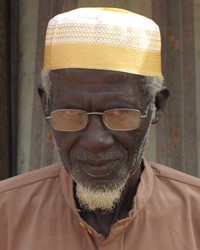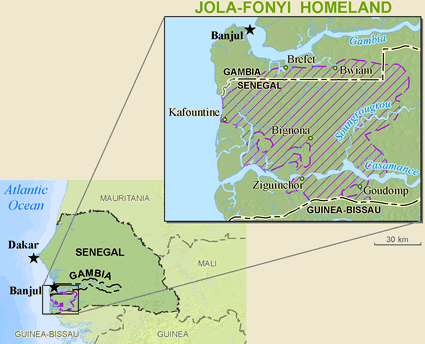The Jola are a friendly people who are very relaxed and known for being charming with strangers. The Jola reside in southwestern Senegal in isolated, forested regions of the Casamance with smaller concentrations in the southern part of the Gambia and northern Guinea-Bissau. They have a subgroup called the Fonyi, who speak their own dialect, Jola-Fonyi.
Mostly farmers, the Jola-Fonyi raise peanuts and rice. The women are responsible for gardening, rice, food preparation, care of the house and children. The men cultivate and produce the cash crops: peanuts, citrus fruits and mangoes. Family is central to the Jola culture, and all are treated equal while performing their roles in the village. They strongly depend on each other for their survival.
Young people are taken to "bush schools" when they reach puberty, at which time they are circumcised. They prefer to marry cousins and ask for the bride price in the form of livestock.
Folk or popular Islam is the predominant religion. The traditional Islamic beliefs have been changed from the true meaning to fit pre-existing fears and beliefs. They follow Allah out of fear, not love. The Jola believe in both good and evil spirits. The good spirits protect houses from curses and other troubles while the evil ones demand sacrifices. Shrines are also very prevalent with various meanings attached to each one.
Fonyi speakers are much more Christianized than the other Jola peoples. They need a spiritual revival that will drive them to share their faith with their Muslim neighbors.
Pray that the Jola-Fonyi people will hear and understand the word of God in their heart language.
Pray that respected leaders and elders of villages to give their lives to Christ.
Pray that their medical and nutritional needs will be met.
Pray that peace will reign in the Casamance region where many Jola-Fonyi reside.
Pray for the Lord to raise up many Jola-Fonyi people as ambassadors for Christ.
Scripture Prayers for the Jola-Fonyi in Gambia.
West Africa Gateway
| Profile Source: Joshua Project |













